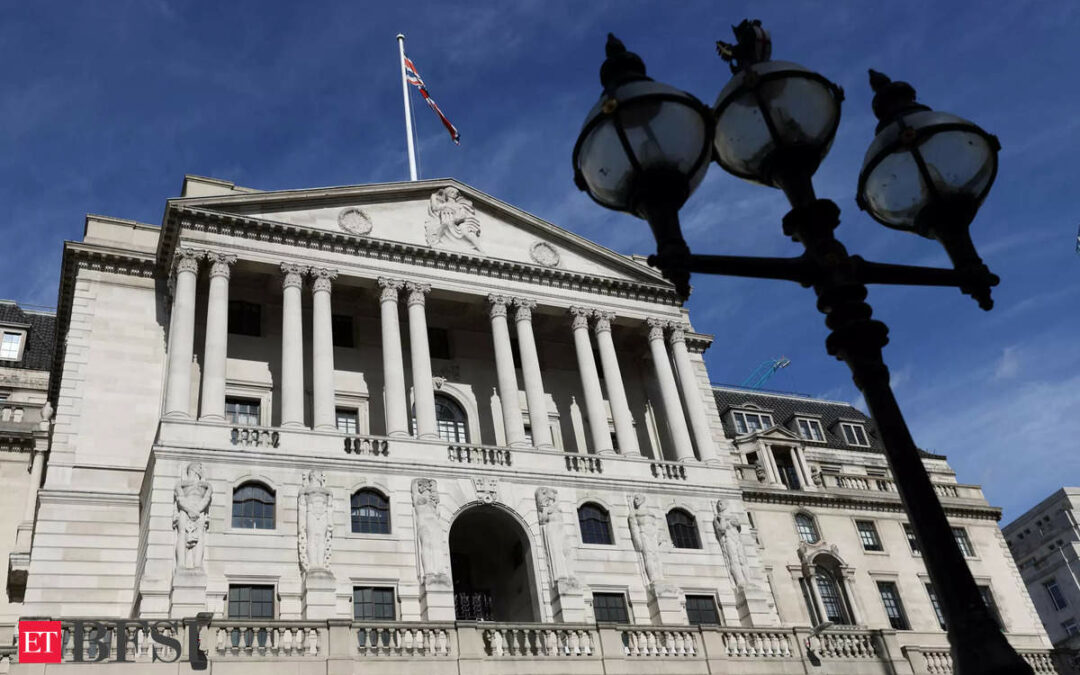The Bank of England held interest rates at a 15-year peak as it kept up its fight against the highest inflation among the world’s big rich economies, and it stressed that it did not expect to cut them any time soon.
Despite publishing forecasts which now show the British economy now skirting close to a recession and flat-lining in the coming years, the BoE held Bank Rate at 5.25% for the second meeting in a row after 14 back-to-back increases.
It also reinforced its message that borrowing costs were set to stay high, even though only about half of the impact of its long run of rate hikes have been felt in the economy so far.
The Monetary Policy Committee (MPC) voted 6-3 to keep Bank Rate on hold, in line with economists’ expectations in a Reuters poll.
“The MPC’s latest projections indicate that monetary policy is likely to need to be restrictive for an extended period of time,” the BoE said. “Further tightening in monetary policy would be required if there were evidence of more persistent inflationary pressure.”
In September, the BoE had said rates would need to remain “sufficiently restrictive for sufficiently long.”
Governor Andrew Bailey also tried to hammer home the message that inflation’s fall over the past year from its highest since the 1980s and the weaker economic outlook should not be seen as a sign that rate cuts might soon be on the table, and a more likely possibility was another rate hike.
“We need to see inflation continuing to fall all the way to our 2% target,” Bailey said in a statement.
“We’ve held rates unchanged this month, but we’ll be watching closely to see if further rate increases are needed. It’s much too early to be thinking about rate cuts.”
The decision to keep rates on hold echoed moves by the European Central Bank and the U.S. Federal Reserve over the past week. They are also waiting to see if their strong dose of rate hike medicine will curb the world’s worst outbreak of inflation in decades.
Policymakers are also watching for any signs that the conflict in the Middle East causes a fresh round of higher inflation as it pushes up oil and gas prices.
MPC members Megan Greene, Jonathan Haskel and Catherine Mann voted to raise rates to 5.5%.
Sarah Breeden voted to keep rates on hold at her first meeting as an MPC member since replacing Jon Cunliffe.
FLAT-LINING ECONOMY
The BoE has said it is determined to stamp out the risk of a damaging spiral of higher pay and prices.
Although inflation has fallen from 11.1% just over a year ago to 6.7% in the most recent data, it remains more than three times the BoE’s 2% target.
The central bank said it now expected Britain’s economy to have flat-lined in the July-September period and to grow by just 0.1% in the fourth quarter, with zero growth forecast for 2024 and an expansion of just 0.25% in 2025.
But even so, inflation would only return to 2% at end of 2025, roughly six months later than previously forecast.
Investors think the BoE has reached the end of its run of rate hikes, given the risk of a recession.
In the run-up to Thursday’s announcement they were betting that the BoE will keep interest rates on hold until at least August next year when it would probably start to cut them.
The BoE showed no sign that it was challenging those expectations: its forecasts on Thursday showed that, based on the market’s pricing for Bank Rate in the future, inflation would fall to its 2% target in two years’ time.
The slowdown in the economy and the fading impact of last year’s gas price surge is likely mean inflation resumes its fall soon. The BoE said it was likely to drop to 4.8% in October, almost two full points lower than in September.
But the BoE is still keeping a close eye on strong wage growth which it fears could keep a flame under inflation.
The central bank said there were “increasing uncertainties” about official data on the labour market, which has been hampered by low survey response rates, but jobs growth was likely to have been weaker than it previously thought and the worryingly strong growth in wages was expected to cool off.
The BoE forecast the unemployment rate would rise to 5% in two years’ time from around 4.2% now, based on the market’s path for interest rates.
One detail in the BoE’s otherwise downbeat assessment of the economy is likely to be welcomed by Prime Minister Rishi Sunak.
It predicted inflation of 4.6% in the fourth quarter of 2023 which would mean Sunak meets his pledge to voters to have price growth this year, ahead of a national election which is widely expected in 2024.









